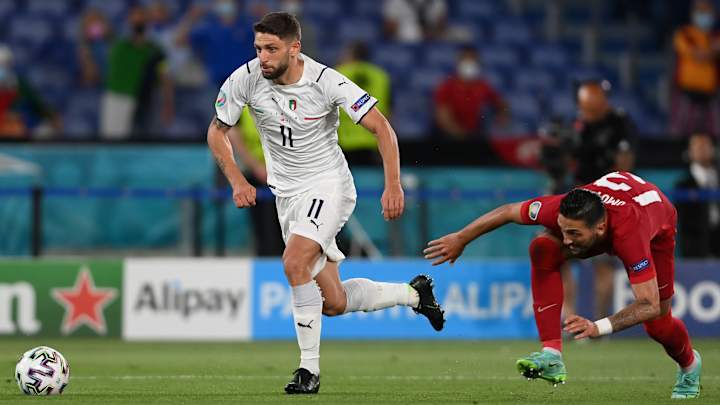Italy Opens Euros With a Vengeance Against Overmatched Turkey

The most striking aspect of the opening game of Euro 2020 was how one-sided it was. What had been billed as a battle between a giant on the rise again and an insurgent force became almost a walkover. The question was whether this was Italy playing very well or Turkey playing very badly, and that is something that will probably only become apparent as the tournament goes on.
Italy had failed to qualify for the 2018 World Cup for the first time in 60 years, but improved sufficiently under Roberto Mancini to win every game in Euro qualifying for the first time. The doubt, as it racked up 28 games unbeaten, was that it hadn’t faced any side of top quality—and perhaps it still hasn’t. But this was a hugely impressive beginning, a comfortable win in which it was barely troubled.
Turkey’s coach, Senol Gunes, meanwhile, may wonder whether, with this squad, extreme caution was really the best approach. It wasn’t just that Turkey lost, it barely landed a blow. With four best-third place teams to qualify, the possibility of reaching the last 16 remains very much open, but there will have to be a significant improvement, and far greater ambition and intent, against both Wales and Switzerland.

That the game was even being played felt like a triumph of sorts. It may have been a year later than scheduled and there may only have been around 16,000 in Rome's Stadio Olimpico, but some sounds far, far better than none. What better way to celebrate the return of fans than by having Andrea Bocelli sing "Nessun Dorma"—a thin version of Luciano Pavarotti’s efforts at Italia 90, perhaps, but an echo of much happier times. That both sides were booed in possession, at least until everybody’s enthusiasm waned by the midpoint of the first half, suggested significant numbers of Turkish fans in the stadium and at times, the jeers resonated sufficiently you could almost believe the stadium was full and everything was back to normal.
Less welcome was the delivery of the ball to the center-circle for kick-off in a remote control car, notably one representing a tournament sponsor. The previous fad for referees collecting the ball from a plinth that often resembled a coffin turned on end was also odd, but at least didn’t offer the tacky sense that everything in football is on sale to sponsors.
What followed was, as a contest, a little disappointing. Turkey had been hailed by many as dark horses, a proactive young side spearheaded by the veteran Buruk Yılmaz, whose goals had inspired Lille to the Ligue Un title this season. But it offered almost nothing, and looked exhausted long before half-time.
That perhaps was a reflection of the pressure Turkey was placed under by a very good Italian midfield. The worry for Italy was supposed to be a lack of penetration, but this was the first time it had ever scored more than two in a game at the Euros. It took a while, though, for the first goal to come and the biggest talking point of the first half came as a cross from Leonardo Spinazzola struck Mehmet Celik on the arm caused particular consternation—evidence perhaps of how the handball law will be applied. The new interpretation, that takes the expected position of the player into account, is being applied in this tournament.
When the breakthrough came after 53 minutes, it was an own goal and the result of a slip. Italy’s threat had largely come from wide areas, and as Domenico Berrardi broke into the box, Umut Meraş stumbled. Berradi hammered the ball across goal where it hit Mehemt Demiral and rebounded into the net.
THE FIRST GOAL OF #EURO2020 IS AN OWN GOAL! 😅 pic.twitter.com/fkqykh0g4q
— ESPN FC (@ESPNFC) June 11, 2021
What would be most worrying for Turkey was its failure to react having gone behind. There was no response, barely a hint it had the wherewithal to get back into the game; rather it looked utterly flat, devoid of ambition or hope. At one point, Yılmaz burst forward, looked about for support, saw nobody alongside him and had to keep going himself.
The second came 13 minutes after the first, Ciro Immobile slamming in his fourth goal in his last five internationals—perhaps beginning to answer the charge he rarely does it for his country—after Uğurcan Çakır had blocked a shot from the excellent Spinazzola. A poor clearance from the keeper then led to the third, a slick skein of passing generation space for Lorenzo Insigne, who bent the ball into the far corner.
Far bigger tests lie ahead for Italy, but this was a mightily impressive start. Mancini’s side, well-organized and inventive, constantly manipulating angles, looks like potential winners.
